Never Stop Learning, with Sharon Hughson
https://www.buzzsprout.com/971221/9730539Never stop learning, with Sharon Hughson
Emma Dhesi:
Well, welcome, Sharon. I’m so glad to have you on the show because we’ve been sort of in each other’s world for a little while now. So it’s lovely to finally get you get you on the podcast.
Sharon Hughson:
I am so fortunate to be here with you.
Emma Dhesi:
Well, I wonder if you wouldn’t mind sharing with us all, just about your journey to racing and to where you are? No.
Unknown:
Okay. Well, I’ve been I feel like I’ve been writing my whole life. I wrote my first book. Yes, that is in quotation marks. When I was in third grade, it was called the horse killer. I wrote it in a spiral notebook. And I still have it, as well as my second and third books that I wrote in spiral notebooks when I was a kid. So I have loved reading and writing pretty much my whole life. And, and I always dreamed of being a published author. But back when I was in school, it was not touted as something realistic. You were well, but what’s your going to be your real job while you pursue that on the side. And of course, the publishing industry, as it was then was very difficult to break into anyway, and not necessarily lucrative. So I mean, it makes sense that your parents and your teachers or whatever want you to have a better plan than that, right.
Sharon Hughson:
So it’s really exciting to me, that we have this new paradigm for publishing. So you don’t have to wait for the gatekeepers to say yes, you’re good enough. You don’t have to go through all those hoops. I mean, you can you can choose to, or you can choose to Self Publish, and you can, it can be lucrative, not like vanity presses, which was the only way to Self Publish when I first started writing so many years ago. So it’s really to me, I’m excited by it, I have been published by two different, or three actually different small indie presses, as well as it’s doing some self publishing. So I’m kind of familiar with both tracks. And I, I just still love to write I fall into stories and get lost in those worlds, whether I’m reading them or writing them. So.
Emma Dhesi:
So tell us about your fiction, because you’ve written across a couple of different genres. So tell us about them
Sharon Hughson:
yes, I have. So myself, I have self published some of the stuff that was previously traditionally published once I got my rights back. But the first thing I self published was a pondering heart in my reflections series, and that’s a biblical fictionalization series. And that story actually, just kind of came to me out of the blue, and I didn’t want to write it. I fought against writing it for a couple years, and then I would write a few scenes and then I’d be like, No, I didn’t. Because I I’ve read biblical fiction. It’s not like my favorite genre or anything. I’ve read it just because I think it gives me an interesting, I told you Yeah. Okay, um, so it’s because I feel like there’s a lot of pressure on that to get it biblically accurate, and that I’m not a scholar of that time. So I also don’t know whether or not to be able to portray life in the first century, Israel in a good manner. So but what I do have is a friend that I graduated from high school with, he has a degree, he’s a doctor, and he is a practicing Jew, but he’s a Messianic Jew. So he does believe that Jesus Christ, Messiah, but he has a degree in his degree is in first century Jewish culture. So he read my books to make sure that they were not out of the world out of the realm on
Emma Dhesi:
this so interesting that you resisted doing it but still there was this pool. This is like calling say, No, this is
Sharon Hughson:
what you have to ride it. See, that’s the thing about Sheena rider, the stories won’t if there need to be written, they won’t let you go. I know a lot of people are like, well, if I don’t write this, then I’m going to lose it. And I’m like, well, that hasn’t necessarily been my experience. If the story wants to be read written, it is gonna keep after you until you write it down. So I have three books in that series. And then I have two sweet Christian romances both that were published with sweet promise press originally, but when I got my rights back, I went ahead and republish them. So one is about a middle aged second chances romance. And the other is a kick out a cowboy, and it’s a former soldier and a cowboy. And it was written originally as three novellas that they published together as in a collection and I just put them so you have the whole meet cute through the happily ever after. You know? So anyway, that is what I have for that I do have a few other things on there that might be considered nonfiction. But my passion is really for fiction.
Emma Dhesi:
Mm hmm. I didn’t know that you’ve gone through a small press as well as it did, is there anything you can sort of spring to mind that was the main difference between working with a small press and being indie, and either good or bad.
Sharon Hughson:
So the good news is that they have a wider reader base than what I have for myself. So my work was published out or press out and presented to their wider base, for example. So we promised press had a base of 10,000 readers. And so every time they released 10,000, readers would hear about your release. And so I got, you know, quite a few sales there. Most indie presses are really good about they pay you in royalties, only most of them, and you get half of half of the net. So that is also a much better pay rate than you would get from most big traditional publishers who publish or give you quite a bit less than that. And since they require an agent, your agent is taking a cut of all that as well. So um, yeah, it says,
Emma Dhesi:
but that’s good to know, it’s interesting, you know, just, there’s no right or wrong is there. But it’s interesting to know which what your experience was and your sort of takeaways, and there’s always good and bad. So it’s, yeah, nice to have that kind of immediate exposure without having to do a Facebook ad or something like that. Just to know that the the press already have a readership. And thanks, thanks for sharing that with us. And so I know that you’re not only are you passionate writer, but you’re also passionate about helping other writers. And your website has a fantastic resources page. Can you share with us the the sorts of resources you’ve got up there for aspiring writers?
Sharon Hughson:
Okay, great. So I need to update it again. Because a lot of a lot of the bulk is posts, my blog posts that I’ve written based on my experiences, or whatever about specific things so that they can find those. So it’s an easy way for them to find something if they’re going to pitch their book to an agent. Well, I have posts about that, or if they’re, you know, trying to find an editor. Well, I have posts about that. So but the other thing I do is I have linked to quite a few other great resources on the web, like one stop for writers and Kristen lamb who is amazing, about how about helping indie writers promote themselves on social media. And so there’s just a lot of resources like that, that I found. As I was starting out, trying to go help me help me I need information. Well, these ones that are just so fantastic that I have linked those as well, because like you said, I want to help writers, and I remember what it felt like to be a newbie, and go, Okay, where do I start? Yeah, yeah. And so
Emma Dhesi:
it’s it’s an ever changing world, isn’t it? And so this always kind of things to be kept abreast or, and you also have a lovely community and your Facebook group called writes your book, nuc, which is a great title. If anybody wants to join that group, what can what can they expect from from being a member?
Unknown:
So I post six days a week, something, a lot of times, it might be a motivational quote, or it can be a question. I have given away critiques in the past. And so I like to do that. Because paid critiquer is one of my multiple jobs, freelance jobs that I have to try and make ends meet. Because we all know that offer pay still isn’t necessarily a top notch. And so I do that I have I do weekly lives where I’ve before it’s been courses, which I’m going on sliding that onto a YouTube channel, but I still go live usually and give a tip. And every member is encouraged to post if they have a question. So I’ve had members say, Hey, I’m looking for beta readers. I’ve had members going, here’s my story I did does it sound good? And different things like that. So it’s a place where it’s a safe space for riders to ask questions about whatever they want. Usually, twice a month. I have a post that says, hey, ask me, What are you struggling with? Ask me about it right now. I want to help you. Yeah. So to remind people that I am there as a resource for that and not just me.
Sharon Hughson:
All the other writers will have varied experiences as well so they can also answer and give feedback about questions that are there. So I really wanted to be that safe space for writers to Just know that they can even come and rant, as long as they were not digging on anyone else, you know, sometimes you just have a bad day or your computer doesn’t back up, and then the the drive fries, and you’re like, I just lost everything I wrote the last two weeks or, you know, no one understands that those struggles and those pains and that anxiety as much as another group of writers will just don’t.
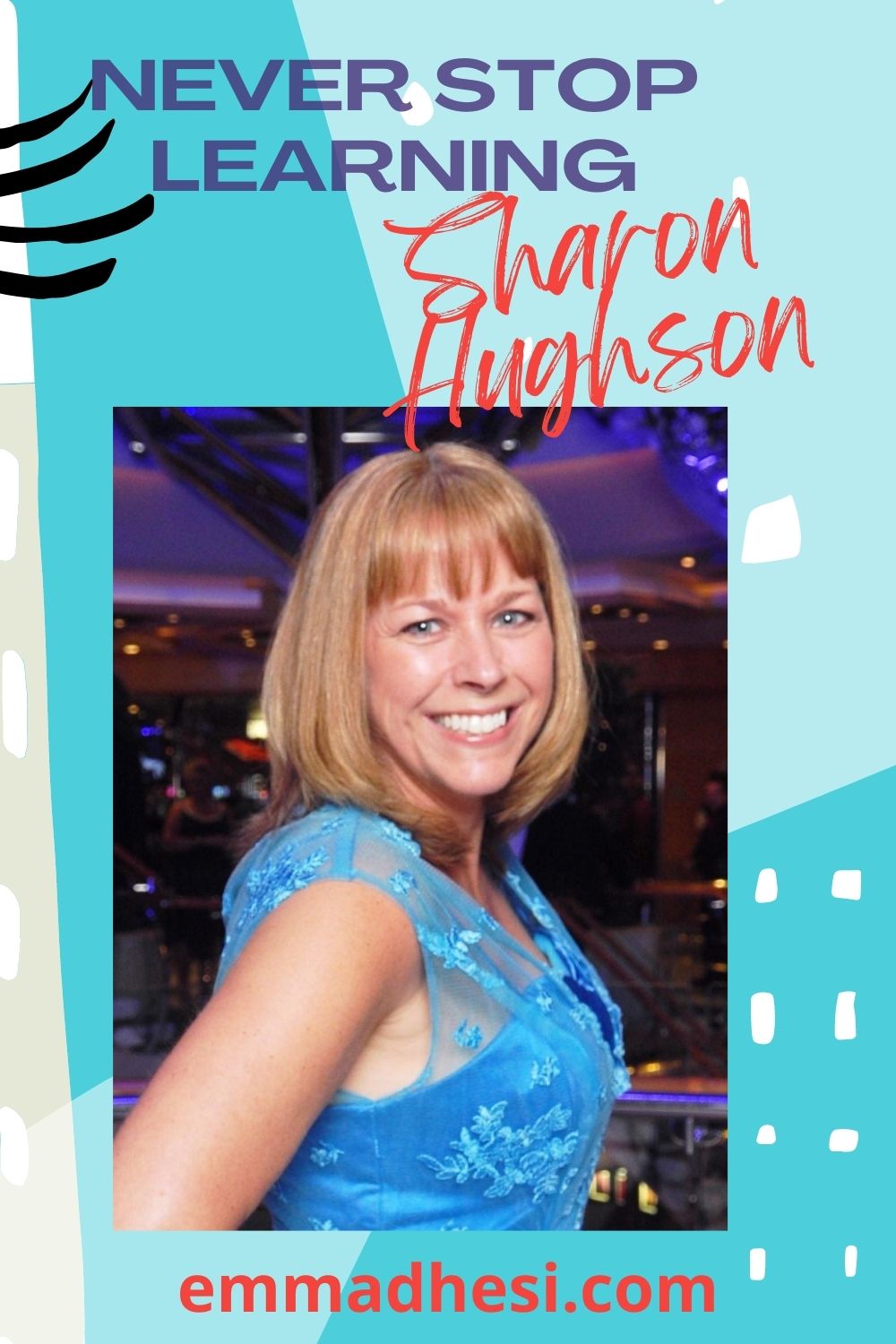
yeah, your group is really active. There’s lots of Bessie, lots of comments coming through it, lots of people responding, it’s definitely a very encouraging place. And I agree, when you’ve got a sort of a safe space like that, then it’s a really good place to mind the hive mind and see what other people are doing and brainstorming. And you know, putting a problem out there, because who knows what will come back and it might just be the answer you need. Or it might spark an idea that becomes the answer that you need. So it’s a great group you’ve got so I recommend people dig it out. So it’s them called write your book nuke lovely title. But that’s not all you do. Oh, my goodness, you’re such a busy lady. You are also a book coach. And you’ve been coaching for quite a while now. But you recently invested in yourself. And you became certified with hope raters. So a big congratulations on that. Because I know that that takes a lot of work and a lot of not just financial investment, but a lot of time and energy investment. And this shows that you really care and are passionate about the writers that you help. How was the experience of going through that accreditation?
Sharon Hughson:
And it was great. I have been coaching since September of last year. So 2020, I guess I don’t know when this podcast goes live. So I guess, two years ago, anyway, so since September 2020, that’s when I took my first client on and I kind of was just, Hey, how can I help you, I’m gonna use my experience type of thing. And my clients were all very pleased with that. But I felt like that’s not really the total of coaching, I have had several different coaches myself, which I just wrote recently about on my blog, because I think that all of us can use coaching in various areas. So it was great to get a format, a methodology and to understand the process from that perspective of what coaching really is. Because according to hope writers ideology of my idea of coaching was kind of a teamwork, like we both are equally into it. And their their thought is that the writer who’s coming to me has all the answers they need for themselves. And my job is just to question them, to help them find those answers to mine. Those answers from within their themselves. And I love that idea is, as a matter of fact, our coaching direct director of coaching called it a thought partnership. And I think that’s, I think that’s an awesome verbiage to use to think about that. So you said a book coach, and my understanding of a book coach is someone who coaches you through the project of a book. So they come to you and they have a project, and they want you to help them through the process. And a lot of those also include critiques. Whereas what hope writers is promoting is just individual sessions where you would have whatever your struggle might be, and you work through it until you work through it. And then you come up with the next one. And so that that’s how they do it. And myself. I kind of visioned myself more as a story, coach, because as you said, I love working with writers. Well, I love talking about stories with writers. I love brainstorming ideas for stories. I love asking them about what Wait, what about that motivation, or the character’s background or all this stuff that’s really important to get a great grasp of if you’re going to have a successful book. Successful fiction story? Yeah, so
Emma Dhesi:
yeah, yeah, like me, I think. I like that. I like that approach. Similar to hope writers that the answer is there inside the individual, it’s in their brain somewhere. They it’s all kind of there, but you’re asking the right questions, asking the right prompts, even being a bit challenging sometimes so that there’s a sparks a response that then brings out that answer. So yeah, I love that approach. I love seeing it when suddenly, a client or student suddenly has that aha moment and they realize what the answer is and how they need to go forward. And so do you also help in through your coaching, talking about the story, uncovering all of that, do you also help sort of with the structure of the story and helping them get through, you know, all the plot points We need to get through getting that right arc into the climax, that kind of thing.
Sharon Hughson:
Yes. So, um, the one code the one fight has been with me the longest, we worked through her first draft. And yes, it was very much that we lined out all the beats, she ended up writing the synopsis two different times to get to me because to me, that’s how you can get even if she’s, she does want to go traditionally. So she will need that synopsis for submission submitting. But even if you were going to be indie, it still helps you get a pulse, like, do I have a complete story here. And so that’s kind of what we use to help her through that. And she is signing on with me in January to work through the revision process of that manuscript. So I don’t feel like that’s a pretty good.
Emma Dhesi:
It’s a good indication, automation that she was, he felt like it was very successful working with me.
Sharon Hughson:
So I think it depends on what the what the writer wants. But indeed, if they say help me make my story, right, I would definitely be talking about what structure plan they used. So yeah, because there are there. There are different ones, as far as they’re all really the same. But they tend to use different words and different. Whatever.
Emma Dhesi:
Yeah, yeah. And what so what kind of writers do you like to work with? Or maybe I should ask, first of all, do you? Do you like working with specific genres? Do you work with fiction nonfiction memoir? Do you work with voters across the border, do you specialize?
Sharon Hughson:
I have, I worked with nonfiction, and memoir, as well as some fiction writers, for my practicum for my 35 practice hours that I needed to get my certification. And I really enjoyed working with all of them. It’s just different the way that you work with each kind. And that depends really on the struggles of the, the writer that they come to you with. So like the memoirs, she was a really a very beginning writer, and she’s still very insecure about her abilities to write. And so it was working through those things, which, Hey, I’ve been published. So for seven years, and I still have those insecurities sometimes. So it’s like, I totally relate and get that. So if I’m going to work on stories, yeah, romance, women’s fiction, fantasy, young adult, those are the genres I read the most. And so I feel like, I would be up front with any writer that came to me to let them know that my, most of my experience would come with those, but is about those genres. Um, but I think the knowledge of structure kind of translates across the board. But you know, genre expectations are a real thing. And so that’s something that self published, writers really need to be cognizant of that their readers have an expectation. And so your story needs to measure up to those expectations that readers have.
Emma Dhesi:
Yes, absolutely. 100%. I’m just trying to think because you offer so many. You have many offerings for your clients, is there, is there something I haven’t mentioned or forgotten to ask you, I think you do developmental editing, is that right?
Sharon Hughson:
I do do editing too. And I like developmental editing is my favorite type. I do copy, edit, and proofread as well. I actually have a proofreading job on my desktop right now to do once we finish this call. Um, but I like developmental editing the best because if you don’t get that story, right, I think it goes, it connects in with my love of wanting to be a story coach, that if you don’t have all those pieces in place, your story is not going to satisfy. And so the best place to get that is with your developmental editor to point out those things and help you help you fix all that and strengthen it. So you have the strongest Best Story possible. Yeah, what I will say about my editing is a it’s a lot less expensive than what I paid for my editing. Because I feel like a lot of people who want to be self published don’t have a lot of money to spend, but I want them to be able to still put out a high quality product. And to do that you need an editor. And the other thing is, is that my mindset of it is always about your style, your story, your message and not mine. It’s not about me. But the truth is, is that if you don’t hit those structure points, you’re not going to be able to get the message out your story isn’t going to resonate the way that you want it to. So as a developmental editor, I’m picking up those things about that as well as character development that is such a huge thing. And when I first started writing, that was where I completely was terrible. because I just wanted to tell the story. And I, you don’t realize how much that character motivation and their arc is really tied in with the good, good stories that you love. Yeah. And so that was something that I spent several years do going through craft courses and whatever, to strengthen that aspect of my writing. So yeah,
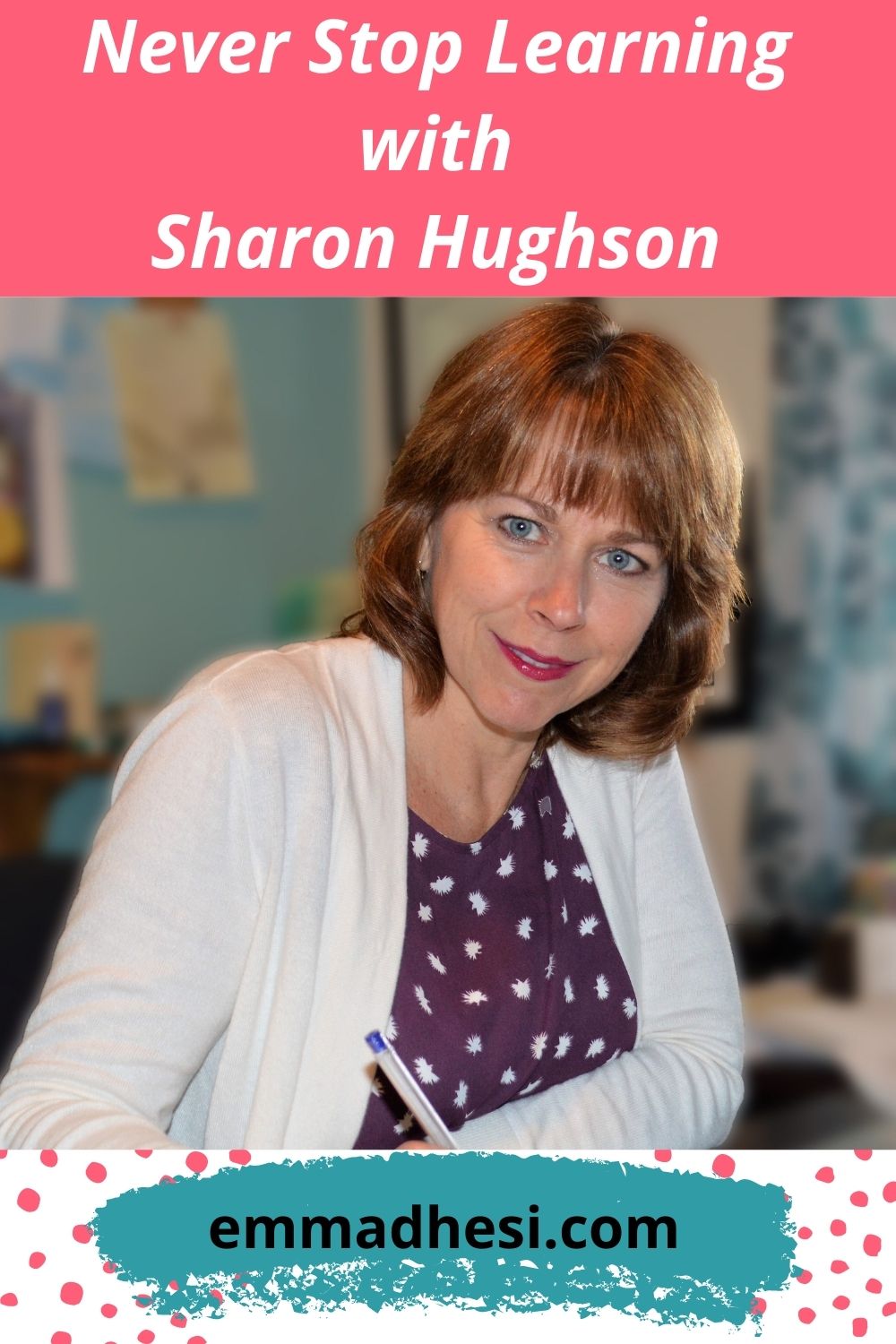
Interview with Sharon Hughson
Emma Dhesi:
yeah, I think it’s quite common, isn’t it amongst new writers, we get very hung up, or very focused on the plotline and making sure that we get the plotline. And it can be easy to forget, actually, that character is equally as important. And they they sort of marry with one another. I’m certainly the same, you know, over. So I think I read every kind of plot book out there trying to find the right type of structure that was going to work for me, when really spent a little bit more time on the character, perhaps it might have been slightly easy for that story to move along a bit more organically. It’s interesting. I remember what I did want to ask you, because you’d mentioned that you have used coaching in the past as well or you still do, what do you feel is kind of one of the benefits of working with a coach, as opposed to just going out alone.
Sharon Hughson:
So going alone is just hard. Finding the right coach is important. I’ve worked with four different coaches. But all of them were for different things. I went to a coaches coach to help me build my coaching business. And I went to a business and a writing business marketing coach to help me with my launches. And then I’ll creativity coaches, that other type of coach I went to because I was kind of in writer’s burnout for a couple years, and I was struggling to try and get my creativity back I was having my well was empty, and I was having a hard time struggling with that. And so it really helps to talk to someone who that is her focus and that she was certified with that, how to work on creativity and build that. So I think that a lot of times we don’t even know what we need or what our story needs or whatever and having an outside person be able to look in, they have a different perspective that can offer us insights. And like you said, that aha moment is the best thing to see on I was a teacher before I was an education for more than a decade before I became a writer. And it was the same with students when they would have that aha moment like I get it. Oh, wow. Okay, this totally makes sense. And it gives you such joy to see that moment happen. And writing is a solitary profession. You write in your office by yourself, all of us do. That’s what we do. We’re encouraged to shut our door and get you know, so you can’t be interrupted so we can get into our story. Okay, great. Except for sometimes you get stuck, sir. And and when you first start out, you don’t know when your writing is good enough. So you really do need someone who’s more experienced who’s farther down the line? Who can help you suss out those answers. And so I guess my thing is, why go it alone, when you don’t have to? I think about me 10 years ago, when I first started, okay, I’m going to get serious. And I’m gonna submit and bumbling along and what I wish there had been writing coaches back then. But there weren’t, it’s a newer thing. You know what I’m saying? And so it’s like, why go it alone? If you don’t have to? Yeah. So yeah,
Emma Dhesi:
makes the journey so much more fun. Takes a lot of the pressure off, doesn’t it of just feeling like you’ve got the whole weight of the world on you. And only you can do this. And I think in no other profession, even other artistic professions. I don’t think anyone else does this quite so alone. If you think about, you know, songwriters or artists or sculptors there, there’s a community there. Yes, they might have to do the painting and the sculpting alone, but it’s with a teacher with a guide with a mentor. But for some reason, I don’t know where it’s come from. We feel that as writers we should be able to do all by ourselves, even though it’s a really, really difficult intellectual endeavor. But yet, we still think we’ve got to do it all by ourselves. It’s a funny one. It’s a conundrum to me, I have to admit, is it is very strange. But let’s let’s change tack a little bit because I’d like to come back to your own fiction. And I’m wondering, do you have time for your own fiction still? And if you do, what are you what are you writing?
Sharon Hughson:
Well, I did do National Novel Writing Month and I as I went through it, I decided this probably will be my This was probably my last year doing it. So I did it. The first time I did it was in 2013. I became aware of it even before that, because there was a teacher at the school middle school where I were to did it every year. And he was like, I think you have a novel and you usually Do this data. Um, but I would love to talk about why National Novel Writing Month is beneficial for writers, especially beginning writer, but we don’t have to talk about that here. And I did not write a novel, I wrote short stories. And actually, I wrote two different worlds of connected short stories that I was thinking, Oh, maybe I could do the Kimbo Bella thing with these. I don’t know if you’re aware of that. That’s the new episodic fiction that that you do. And so I talked to one of my friend, author friends who is doing it. And so I was like, Oh, wow, maybe I would use that for that. But where I started, my being published was was short stories. And because I’ve kind of been waffling about what novel idea inspires me or is drawing me in. And that’s a huge undertaking, as you know, as a published novelist, yourself. I thought, you know, I don’t want to write something if it’s not really the the thing I should be writing. So I’ve kind of went back to writing shorts. So I entered a few flash fiction contests. And I’m writing some short stories. And so my goal for 2022 is to submit short, and see if I can get some more short stories out there. But that’s why I started I have five or six anthologies, where I have short stories published in them. So that is where I started. And I the benefit of writing short, is incredible for building your muscles, your writing muscles, because you have to be concise. You have to get it done. And I think that it may actually have impeded my ability to be a novelist that I wrote short, short stories and then novellas burst. Yeah, because I’m so used to condensing my story into a short space. Mm hmm. That it’s difficult then to flesh it out. Like I wrote a women’s fiction book that was really close and dear to my heart. And it was 72,000 words, and I pitched it and everyone I pitched it to at the conference was like, holy like the story I did, but we wouldn’t even look at it until it was 80,000 words or more. Oh, wow. Okay. Yeah. And so it was like, wait, what I had already fleshed it out, because it started out as a short story. That just I couldn’t let go of and I kept flushing, questioning, questioning.
Emma Dhesi:
So do you think short stories are where your heart is actually, that that’s, that’s your first cold?
Sharon Hughson:
And I really am leaning toward that I’m going what I, which is something I’m gonna be working through with my writing coach. Is, is there a reason why I think I have to be a novelist. What’s wrong with just writing shorts and being a short story writer? Because yeah, I definitely have always felt that call. And even between novels, there be times when I’d have a short story, I didn’t I just, you know, whip it out. Yes. That’s a great thing about something. That’s five 6000 words. It doesn’t take you very long to write it. And so you can get it out. And you go, yes. All right. Now send me the next one.
Emma Dhesi:
Nice feeling of completion, like
Sharon Hughson:
our new ideas, don’t we? And so, when the short story, hey, get to the next new idea a lot quicker.
Emma Dhesi:
Sharon has been lovely speaking with you. I’ve so enjoyed our conversation today learning more about what you do. And the accreditation. So congratulations again on that. If our listeners want to find out more about you, and what you offer, where’s the best place to do that?
Sharon Hughson:
So you can find me at Sharon hewson.com There, the resource page you talked about there?
Emma Dhesi:
Well, Sharon, thank you so, so much for our conversation today. I’ve loved learning more about you and everything that you do. But if our viewers would like to learn more, where can they? Where can they find out?
Sharon Hughson:
So the best place to find me is on my website, Sharon houston.com. And you can find out everything about me there, my books, my services, and of course, that resource page that you like, and I’ve met other writers say wow, that’s pretty incredible. So that as well, if they are on Facebook, write your book neck, and it is a they can find it. But they will have to ask to join it before they can post your see all the other posts, but no big deal for that. So if that Facebook is the place they like to go, that’s a free coaching resource for them. So those are the two best places to find.
Emma Dhesi:
Wonderful. I’ll make sure that we have the links to those in the show notes. Sharon, thank you again. It’s been lovely.
Sharon Hughson:
Yes, have a wonderful day and thanks for having me.
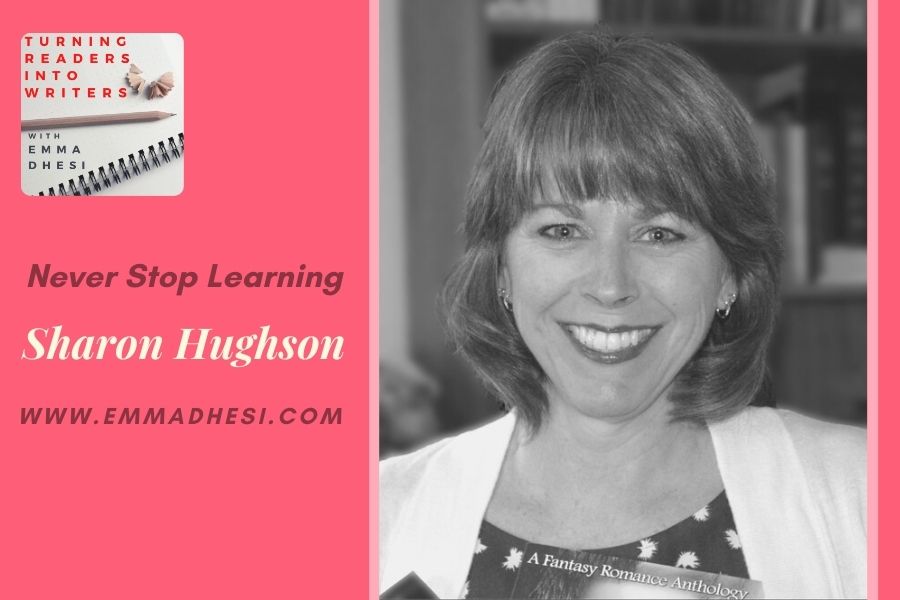
If you are trying to write your novel, but lack the confidence or self-belief to see it through to the end, then join me in Unlock Your Creative Block.
It's the only programme that gets to the heart of why you can't finish your book, even though it's what you want to do more than anything else in the world.
Shortcuts for Writers

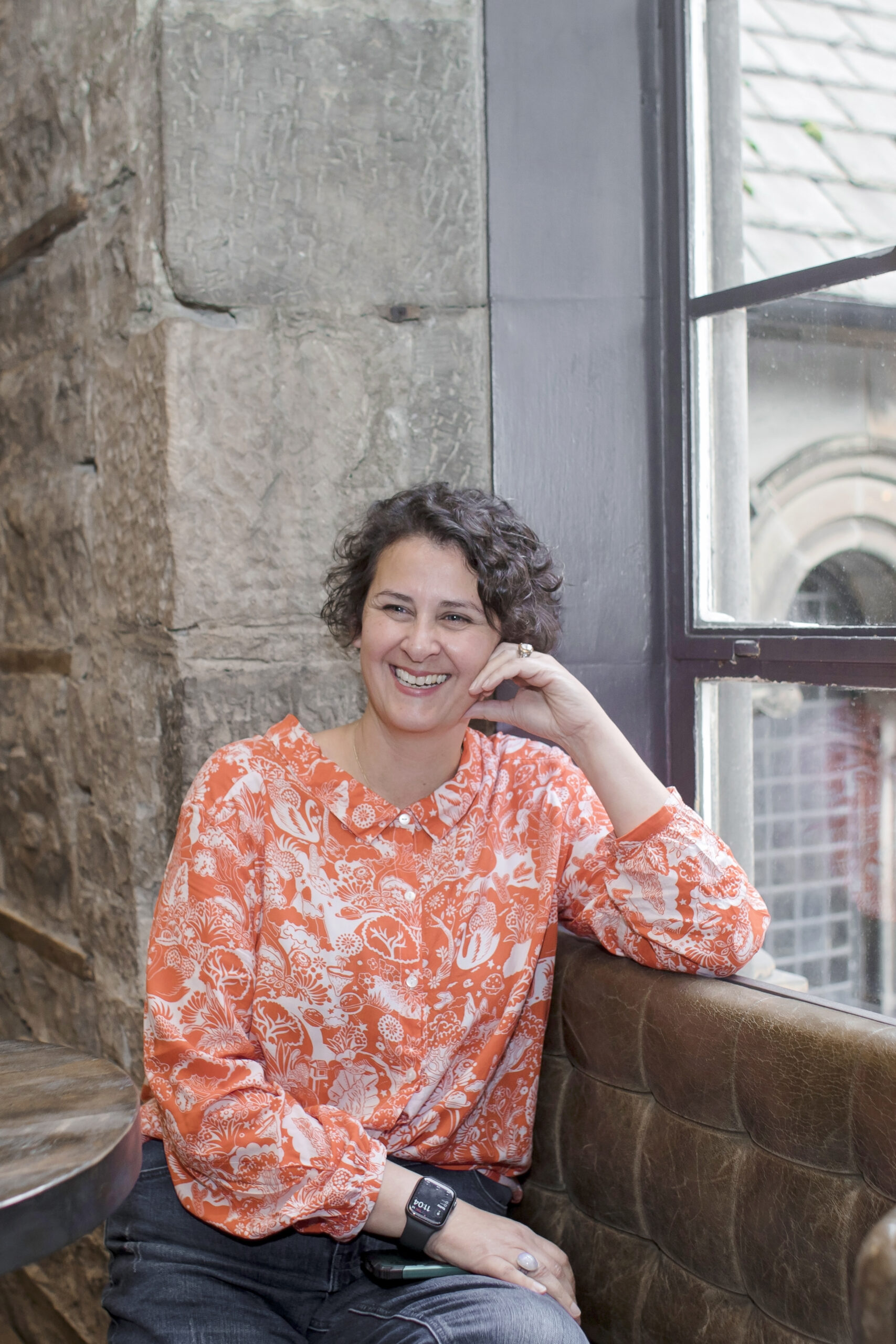
Emma Dhesi
Emma Dhesi is author mindset coach and bestseller author who helps writers let go of perfectionism, self-doubt and writer’s block through her signature programme, Unlock Your Creative Block.
She is the host of the YouTube Channel, Emma Dhesi, where she interviews debut and experienced authors alike.
Through her 1:1 coaching programme, Emma helps new authors start and finish their first novel.
Emma provides personal written feedback on their pages and guides them through the emotional rollercoaster that is writing a novel!


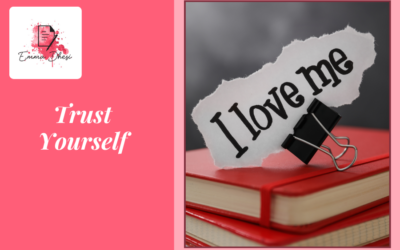
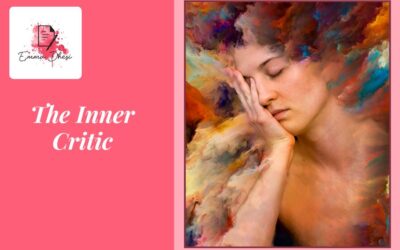
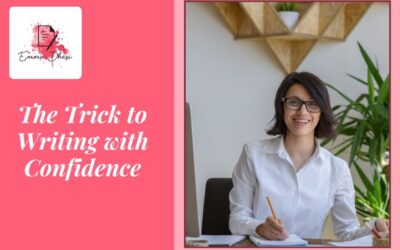
0 Comments